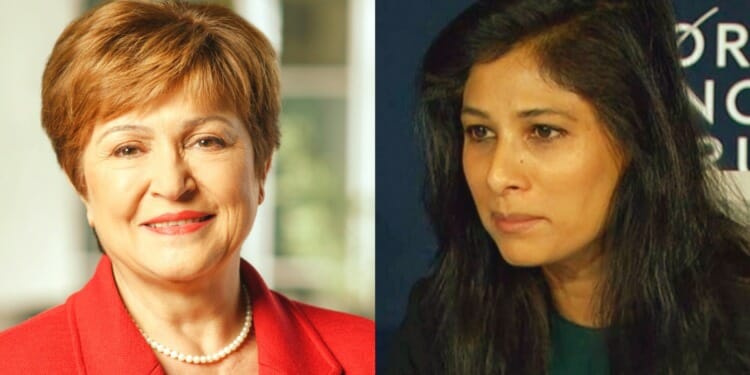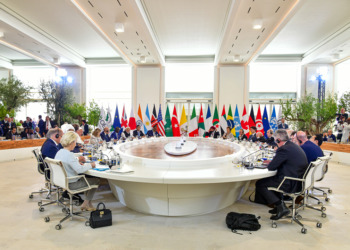The IMF, the International Monetary Fund (the Fund) was created at the Bretton Woods Conference in 1944 and came into force in 1947 for the purpose of securing international monetary cooperation. For more than sixty years its Managing Director was a European and always a man. But recently, things changed and the glass ceiling was broken with two women assuming leadership, Kristalina Georgieva as the Fund’s Managing Director and Gita Gopinath as the Deputy Managing Director.
The change began a decade ago. In 2011 the then Managing Director, Dominique Strauss-Khan resigned, as he put it, in order to “devote all his energy” to battle a sexual assault charge. He was quickly replaced by Christine Lagarde, a former French Minister of Economy, Finance and Trade, the first occasion a woman was made the Fund’s Managing Director, and she was re-elected for a second five-year term in 2016. In 2019, before her second term ended, Lagarde resigned to become the President of the European Central Bank.
With the gender “ice” broken at the Fund, so to speak, Kristalina Georgieva, who had been Chief Executive at another Bretton Woods institution, the World Bank, was chosen in 2019 as the Fund’s second female Managing Director. When the existing First Deputy Managing Director resigned in late 2021, Georgieva proceeded to appoint Gita Gopinath as the IMF’s First Deputy Managing Director.
2022 is the first time in history when two women lead international finance.
Gopinath, originally from Calcutta and an advisor to the Chief Minister of Kerala, India, had been the IMF Chief Economist from 2019 and in this role had co-authored the “Pandemic Paper” which set global targets for vaccinating the world.
The Pandemic Paper had a wide impact and, arguably, led to the creation of the Multilateral Task Force made up of IMF, World Bank, World Trade Organization and the World Health Organization. It established a working group with vaccine manufacturers to identify trade barriers, supply bottlenecks, and accelerate vaccines to low- and lower-middle-income countries.
Gopinath’s recent blog – published in May 2021 and titled “A proposal to end the COVID-19 pandemic” (co-signed by the IMF Director and the Head of the IMF Global Health and Pandemic Response Task Force) – reflects her continuing commitment to what she considers one of the most important economic policy areas: “To address many of the difficulties facing the world economy, it is vital to break the hold of the pandemic. This will require a global effort to ensure widespread vaccination, testing, and access to therapeutics, including the newly developed anti-viral medications. As of now, only 4 percent of the population of low-income countries are fully vaccinated versus 70 percent in high-income countries.”
She argues that, in addition to ensuring a predictable supply of vaccines for low-income developing countries, assistance should be provided to boost absorptive capacity and improve health infrastructure. It is urgent, she says, to close the $23.4 billion financing gap for the Access to COVID-19 Tools (ACT) Accelerator and to incentivize technological transfers to help speed up the diversification of global production of critical medical tools, especially in Africa.
Recently in her new position, she reaffirmed she considers that one of the most important economic policy initiatives is to provide more and more equitable supplies of COVID-19 vaccines, tests, and therapeutic drugs.
The fiscal priority for global recovery should continue to be the health sector, and transfers, where needed, should be effectively targeted to the worst affected. In Gopinath’s words:
“At the start of the third year of the pandemic, the global death toll has risen to 5.5 million deaths and the accompanying economic losses are expected to be close to $13.8 trillion through 2024 relative to pre-pandemic forecasts. These numbers would have been much worse had it not been for the extraordinary work of scientists, of the medical community, and the swift and aggressive policy responses across the world.”
.@ignatiuspost, fascinating discussion @washingtonpost on how the economic recovery is losing momentum due to slowdown in the two engines of growth and the ongoing effects of #Covid19 disrupting supply chains and, in turn, putting pressure on prices. https://t.co/DC3Cpaj0hu pic.twitter.com/v3yPsrj955
— Kristalina Georgieva (@KGeorgieva) February 2, 2022
When one looks at IMF performance during COVID-19 it is a remarkable transformation, a case of an institution responding to a crisis well beyond its conventional guard rails, and Gopinath certainly was an influential factor in making this happen.
There is a further aspect of Gita Gopinath that speaks well of her commitment to engaging directly in international economics rather than from an ivory tower.
While in her role as the IMF Chief Economist, Ms. Gopinath was on sabbatical from Harvard University where she held the John Zwaanstra Professorship. In 2022 she would have had to return to the university to retain this coveted professorship. But when asked by the Managing Director to stay in this new capacity, she accepted, giving up the academic equivalent of a lifetime appointment as Justice in the U.S. Supreme Court.
If current leadership and its orientation is any indication, it augurs well for this now 75-year-old institution.
Editor’s Note: The opinions expressed here by Impakter.com columnists are their own, not those of Impakter.com. — In the Featured Photo: Kristalina Georgieva and Gita Gopinath (collage; source of images: Wikipedia cc)










